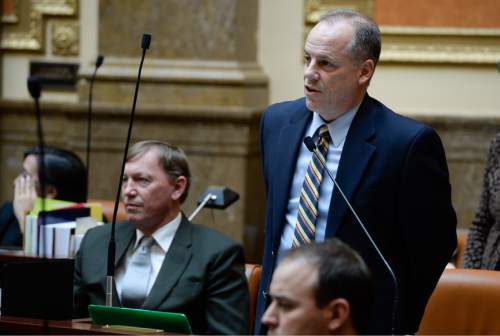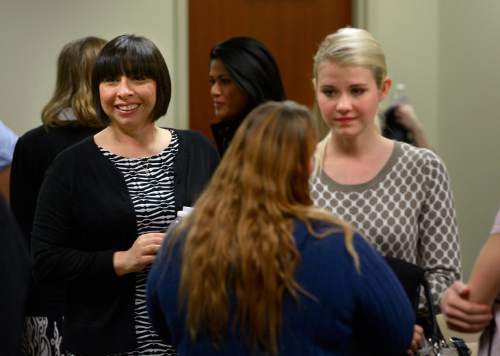This is an archived article that was published on sltrib.com in 2015, and information in the article may be outdated. It is provided only for personal research purposes and may not be reprinted.
If someone can't consent, it's rape.
A Utah measure seeking to make that legal clarification won early approval in a state legislative committee Tuesday, but some lawmakers qualified their support, questioning whether the law would designate sex with an unconscious spouse as rape.
"If an individual has sex with their wife while she is unconscious ... a prosecutor could then charge that spouse with rape, theoretically," said Rep. Brian Greene, R-Pleasant Grove."That makes sense in a first date scenario, but to me, not where people have a history of years of sexual activity."
Others disagreed. If a person is unconscious, having sex with him or her "is rape. Period. End of story," said Rep. Brian King, D-Salt Lake City. "Let's make the statute clear. Let's not dance around it."
According to prosecutors, "consent is a decision that has to be made at the time of the act," said attorney Donna Kelly from the Utah Prosecution Council. "You cannot give consent to sexual activity if you're unconscious."
Utah's current law doesn't adequately protect victims, advocates and others told the House Judiciary Committee at the Capitol on Tuesday.
"This is something that's been a long time coming," bill sponsor Rep. Angela Romero, D-Salt Lake City, said after the meeting. "At the end of the day, if someone's unconscious or they're a vulnerable adult, then the logical answer is: Don't try to have a sexual relationship with them."
Lawmakers parsed HB74 to understand the implications for sex between partners, husbands and wives and those who may be incapacitated by mental disabilities, medication or surgery. The legislation aims to clarify the definition of consent in sexual assault cases.
"I'm not at all trying to justify sexual activity with an unconscious person. It's abhorrent to me," Greene said. But he questioned whether sex with an unconscious person should be "rape in every instance — dependent only upon the actor's knowledge that the individual is unconscious. That's the question. That's what I struggle with."
Holly Mullen, director of the Rape Recovery Center, said the Tuesday debate sidestepped a more important discussion.
"Instead of dicing and parsing and saying, 'Well, what about a wife if she's asleep?' just look at what is happening and the prevalence of sexual assault in our world. It's a tool of power. That might be why they're parsing. They don't want to look at what is really going on around them."
For Derek Deitsch, a University of Utah student and fraternity member who spoke in favor of the bill, the difference was clearer.
"As a male, I think it's important to hold other males accountable for the decisions that they make," said the vice president of Beta Theta Pi, which has partnered with the Rape Recovery Center to raise awareness about sexual assault. "Regardless of their relationship with somebody, that does not imply consent."
Kim Fischer, who is an anchor at KTVX-Channel 4, told lawmakers the bill was important. Fischer was sexually assaulted in college, she said, and decided in recent days to speak publicly about the assault.
Fischer was conscious when a member of her ex-boyfriend's fraternity tried to rape her, she said. She managed to fight off the attacker.
"If I were your daughter, your niece, a friend, how would you want this law written?" she asked the panel.
Rep. LaVar Christensen said the current statute is sufficient. He questioned if simplifying the notion of sexual consent would make the statute more ambiguous.
"You can have the unintended consequences of being so vague and so broad that we can go backward instead of forward," the Draper Republican said. He later added: "It's an uncomfortable discussion to even have."
Rep. Lowry Snow, R-Santa Clara, disagreed, saying the current law "needed to be clarified, needed to be fixed and that the language is proper." Snow, a former prosecutor, added, "I think it can be used to educate our young people in school and on campuses."
Romero, the bill's sponsor, said she isn't certain the bill will pass in the House and Senate, but she is hopeful it will make it to the governor's desk for final approval.
"I think what we're trying to do is the right thing," she said.
The bill now moves to the full House.
Twitter: @anniebknox





